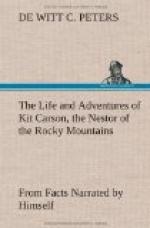“To complete his survey across the continent, on the line of travel between the State of Missouri and the tide-water region of the Columbia, was Fremont’s object in this expedition; and it was all that he had obtained orders for doing; but only a small part, and to his mind an insignificant part, of what he proposed doing. People had been to the mouth of the Columbia before, and his ambition was not limited to making tracks where others had made them before him. There was a vast region beyond the Rocky Mountains—the whole western slope of our continent—of which but little was known; and of that little, nothing with the accuracy of science. All that vast region, more than seven hundred miles square—equal to a great kingdom in Europe—was an unknown land—a sealed book, which he longed to open, and to read. Leaving the frontier of Missouri in May, 1843, and often diverging from his route for the sake of expanding his field of observation, he had arrived in the tide-water region of Columbia in the month of November; and had then completed the whole service which his orders embraced. He might then have returned upon his tracks, or been brought home by sea, or hunted the most pleasant path for getting back; and if he had been a routine officer, satisfied with fulfilling an order, he would have done so. Not so the young explorer, who held his diploma from nature, and not from the United States Military Academy. He was at Fort Vancouver, guest of the hospitable Dr. McLaughlin, Governor of the British Hudson Bay Fur Company; and obtained from him all possible information upon his intended line of return—faithfully given, but which proved to be disastrously erroneous in its leading and governing feature. A southeast route to cross the great unknown region diagonally through its heart (making a line from the Lower Columbia to the Upper Colorado of the Gulf of California), was his line of return; twenty-five men (the same who had come with him from the United States) and a hundred horses were his equipment; and the commencement of winter the time of starting—all without a guide, relying upon their guns for support; and, in the last resort, upon their horses—such as should give out! for one that could carry a man, or a pack, could not be spared for food.




